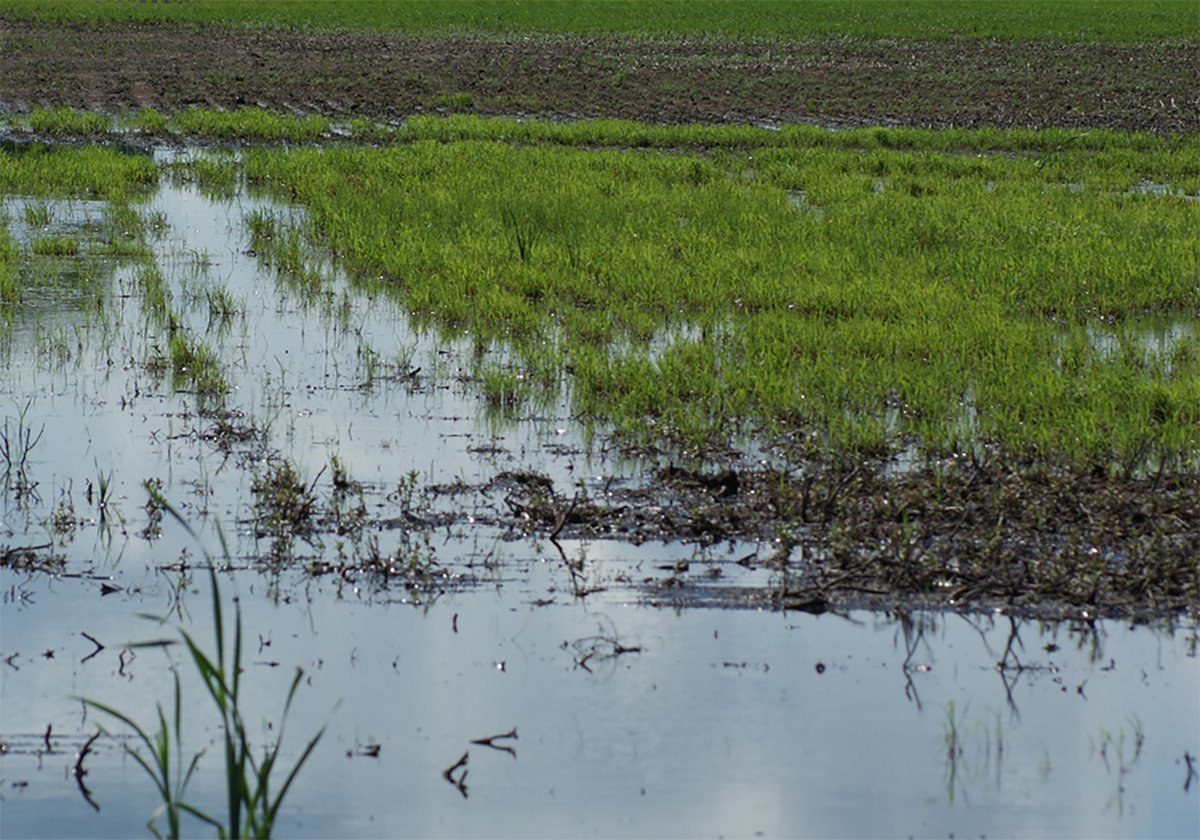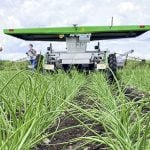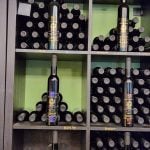Just whack me
After a year and a half I finally know what I get for my 2005 No. 2 white wheat. I wasn’t pleasantly surprised. The final price I received is under $3 per bushel.
That’s a long way from the Canadian Wheat Board forecast of approximately $4 per bu. in the fall of 2005, and substantially below $3.50 per bu. I was expecting. So much for extracting a premium from the market. I could have realized more from the feed market and got paid at the time of delivery.
Read Also

Topsy-turvy precipitation this year challenges crop predictions
Rainfall can vary dramatically over a short distance. Precipitation maps can’t catch all the deviations, but they do provide a broad perspective.
Last fall your paper ran a story about grain being loaded at Churchill, Man. If I recall correctly, they were loading white spring wheat bound for Mexico. A quick look at the map would tell you that the grain would travel about half the distance if it had been shipped from Vancouver to Mexico. How much did that decision lower my price?
I would also like to hear an explanation from the CWB directors for the generous $1,000 stress bonus handed out to 500 CWB employees this Christmas at farmers’ expense. I hope they enjoy the gift.
Considering the $80,000 average salary of CWB employees and the performance of the CWB last year, the bonuses certainly weren’t earned.
Should I ever entertain thoughts about growing CWB grain again, my wife has orders to whack me with a baseball bat and wake me up.
– Roger Brandl,
Fort St. John, B.C.
Double standard
Freedom is the cornerstone of our Canadian Charter. What does it mean to people across Canada?
Freedom of religion, freedom of speech and freedom to choose how we make our living are some of the things we are guaranteed as individuals.
Our nation includes immigrants that have come to Canada from countries less tolerant about individual rights. Many immigrants start new businesses in Canada with the knowledge that they can manufacture and sell their goods to anyone, anywhere in the world.
Unfortunately, the freedom to choose their customers and to export their own products does not extend to every business in Canada.
For over 60 years, grain farmers in the designated area of Canada have been denied this freedom by the government legislated Canadian Wheat Board monopoly.
Tax paying farmers in this area are controlled by a monopoly environment that takes away their right to freely choose their customers and also the right to export the barley and wheat that they grow.
Farmers have even been incarcerated for selling their own grain outside the CWB monopoly.
The Harper government has decided to correct the wrong done to the grain farmers in Western Canada by suggesting that the monopoly powers of the CWB be eliminated and that the CWB should operate under an open market system. This decision was met with opposition from the Liberal, NDP and Bloc (Quebecois) parties.
Many MPs from these parties seem to have a double standard in their views concerning individual freedom and democracy when it comes to east and west.
Some members of the opposition parties insist that a vote is needed to decide whether or not to give western farmers the same rights and freedoms that individual grain farmers in Ontario, Quebec and the Maritimes already enjoy.
Opposition parties and supporters of the CWB monopoly use the words democracy and freedom frequently in their argument. ….
There is no individual freedom within the CWB monopoly.
These rights vanished when taxpaying farmers were legislated to belong to the wheat board.
Democracy in a monopoly is also non-existent. Democracy is defined as social equality and social equality does not exist unless it is nation wide.
The federal government is trying to reinstate individual freedom to western farmers and it is incredibly hypocritical for any Canadian who truly believes in freedom and democracy to stand in the way.
– Lynda Swanson,
Elnora, Alta.
Enough rope
The Winnipeg Free Press reported 500 CWB employees get $1,000 bonus in recognition of the stress and strain they have been under during their fight with the federal government.
That amounts to half a million dollars from our pooled accounts. Farmers had no vote on that handout. Neither did farmers have a vote when the CWB became a monopoly.
This recent disregard by the CWB for farmers’ rights and their money should convince the monopoly supporters just who the CWB supports.
The old saying “give them enough rope and they will hang themselves” is so appropriate after this latest goodie handout to their own.
It is reported farmers will receive a three cent payout on wheat. That means a farmer would need to have sold 33,333 bushels to equal the employee bonus. Who has the stress?
– Rosalynde McIntyre,
D’Arcy, Sask.
Oinker story
It is with some apprehension that I write this true story, as the prime minister, minister of agriculture and my MP are people to look up to, admire and be proud of, as they are democratically elected and should therefore follow, respect and adhere to democratic procedures.
My son raises a few pigs on the farm and we feed them some barley that doesn’t have to be marketed through the CWB. As he’s away to university getting educated, it’s up to Dad, that’s me, to finish off the pigs for market.
When I go into the pen there is one particular pig that always wants to get out the gate and find his own market. He’s very insistent; kind of pig headed. He kind of reminds me of the minister of the CWB, so I’ve called him Chuck.
He’s just always pushing ahead without regard to the majority of his fellow companions in the pen, as if he’s being led blindly by some master figure.
Then there’s another smaller oinker that keeps on rooting him along, making him think he’s got the right idea to get out into the big world. I’ve nicknamed him David.
These two little rascals have got up to market weight with the good barley they’ve been getting out of the master’s trough. They seem to do a lot of grunting as they’re eating, but the other pigs don’t squeal much. It’s as if they’re gagged.
Anyway, the other day I backed up the company trailer and opened the big door. Yep, Chuck was the first one in, being rooted along by David and they got their wish when they were turned into bacon by the big packing plant.
Well, my son’s pig project is done for the year, so I’m into feeding cows for the winter. The price of the old girls sure ain’t worth much. It goes from 20 cents to 10 cents, to 40 cents, then back to 20 cents, all in one month’s time, at the whim of the three big companies that control the prices we get.
Hey, maybe in the years to come we can look forward to our wheat prices fluctuating the same way.
Good luck and good marketing.
– Bryce Burnett,
Swift Current, Sask.
Long memories
Recently I took my usual load of cull cows to town because I heard that the price was pretty good, according to my buyer at the local auction market.
With pretty good being the top cows going for 40 cents a pound and the other cows averaging in the low 20s, my cheque for a liner load of cull cows was quite a shock.
Right now the cattlemen are at the mercy of the packing plants on all of our products, but especially the cull cows.
With cows averaging roughly $350, these guys are being given a licence to steal.
What is the cut-out value of a cull cow? With a 1,300 pound cow yielding 50 percent equals 650 lb. of hamburger averaging $1.50 to $1.89 per lb., we are looking at close to $1,000 minimum after processing, and take into consideration that a number of these cows will also have more expensive cuts.
It’s no wonder that the only people who don’t want the border open are the packing plants.
If they can’t make money now, when they are stealing our inventory, how are they going to when they are actually paying for it?
Please remember we cattlemen have long memories and if we are going to be constantly shafted by the packing plants and that border opens, and our loyalties are not with them, well, let’s just say that I hope you have pretty deep pockets.
– Leon Stang,
Cactus Lake, Sask.
No. 1 issue
Minister (Chuck) Strahl doesn’t understand Canadian Wheat Board elections.
Recently Strahl indicated the CWB farmer director elections were not a vote or “referendum on marketing choice versus monopoly selling” – single desk. As a candidate in District 7, 1 would like to say this is completely untrue.
Having contacted the majority of voters in District 7, it was very clear that the single desk issue was the number one issue in this campaign. If the minister does not understand this, then he is not in touch with his constituents.
It would be interesting to know if single desk candidates had not won four out of five elections, how would have the government spin doctors reacted then?
If the CWB election was not about maintaining the single desk, what was it about? Was it about the Canadian Agricultural Income Stabilization program, which has not been reworked? Was it about the resource revenue being taken out of equalization? Was it about allowing farmers to own the hopper cars or at least only paying actual costs for repair? Or was it about scrapping the gun registry?
If the election was not about the single desk, it is very peculiar that every candidate had a written position on the issue in their biographies.
It is rather ironic that most voters want good, honest and qualified people to run in politics. Yet when these qualities are not exhibited by politicians or they misrepresent the truth, most voters are not willing to correct their behaviour. Thus the cycle continues.
Single desk supporters know that the government will not stop its ideological drive to destroy the single desk, even though it appears to everyone that the majority of farmers support it.
I just wish they would outline the real reason they want to remove the single desk. Abolishing the single desk will not put more money in our pockets. But if the government feels it will, document the amounts. Put their backing behind it like the Americans do for their farmers with the American Farm Bill, and the debate will end quickly.
– Kyle Korneychuk,
Pelly, Sask.
At crossroads
As a farmer I see that there are two main issues that need to be addressed when considering our present state of wheat and barley marketing in Western Canada. One issue involves economics and the other issue deals with our fundamental rights and freedoms as Canadians.
In our CWB wheat and barley marketing system we have seen the volume of grain marketed through the CWB fall an average of over 30 percent in the last 30 years while most non-board grains have increased many times over.
Why is that? Is it because there is more money to be made on a per acre basis with non-board crops where we do not see the influence of the CWB? Is it because in non-board crops we can market and receive full payment at anytime we choose?
Is it because we have more options for risk management strategies in non-board crops? Is it because we have more value added in all non-board crops and little value added in board grains, especially in wheat?
Is it because there is less risk to value added processors to build processing facilities when they can source and price their product from whomever, wherever and whenever they choose?
I believe it’s all of the above. Is it time for change?
It’s unfortunate that we have cereals in our crop rotation, but we have to since we need to mitigate agronomic shortcomings of continuous broadleaf rotations.
However, if left purely to economic factors there would be very little cereals grown for export markets. Even most CWB supporters have to admit that their cash flow and profit per acre is better with non-board crops. …
I’m a farm businessman, in 2007 no less. This is the day of individual rights, tolerance, freedom, fairness and choice. Being a consumer and producer, I want fairness and choice in all my business relationships. But why are prairie grain farmers jailed for marketing their own production outside of the CWB …? Is it because these supporters have marketed their grain through the CWB monopoly for over 60 years, that they fear marketing on their own?
To these same CWB proponents, do you fear marketing your own canola, flax, pulses, oats and feed barley? Isn’t our society built on the fundamental right of freedom, freedom to market our grain to whomever, wherever and whenever we desire including the choice of the CWB?
Should not these same proponents of the CWB be more tolerant to those who want market choice? Let it be known that the market choice supporters have been tolerant to the CWB monopoly proponents for 60 plus years. Is it time for change? You be the judge come plebiscite time.
– Terry Young,
Lacombe, Alta.
Past and ahead
I am 80 years old and these are some of my recollections of the wheat board over the years.
I remember my dad selling 32 bushels over quota. Him and the agent wrote a cheque out to the Red Cross for the amount the 32 bu. were worth.
Along comes the wheat board and summons my dad and the agent to appear in court. The judge fined them $2 each and cost for this over delivery. This happened in the 1940s. Who was the wheat board working for then?
I started farming in 1948 and we had very little quota, it was something like five bushels per seeded acre. At the end of the crop year, they dropped the price of wheat, started the new year out with this new price. When the new crop year started, they opened it up to 300 units. Sometimes they would open a one bu. quota about Christmas.
In the early part of the 1950s, we would end up with a five bushel quota for the year. I don’t remember what year the elevators were full. They opened one bu. in June. Some of us couldn’t get our grain in before the end of the crop year, so they gave us a special quota to haul this grain in the new crop year. They dropped the price of wheat by 38 cents a bu.
This worked out to be $1,900 on 5,000 bu. of wheat. I feel this was just stolen outright.
I also remember Andy McMechen from Manitoba being jailed and put in leg irons for hauling grain to the U.S. There were some farmers from southern Alberta who also did time….
Those of you who think the board is right are entitled to your opinion. I hope you consider this and vote for your freedom of choice.
– Pete Porfoun,
Strathmore, Alta.
Lost for words
Re: Your Dec. 14 issue, “Voters buck Ottawa on CWB.”
I am at a loss for words concerning my fellow farmers who feel a monopoly is the best way to market product.
Most farmers I know are all for free enterprise, which allows them to buy or sell legal commodities to whomever they wish, except, it seems, some of them lose sight of this freedom when it comes to wheat and barley.
Marketing boards of any type, in my opinion, are an infringement on my democratic right to sell any legal product or item to whomever I want and to establish my own price. To me, this is one of the freedoms for which we fought several wars.
I find it difficult to understand why anyone would hamstring their operation to market through the CWB only to receive limited deliveries, payments over an extended period of time and generally lower prices.
Many times I have sold my milling quality wheat as feed grain to independent grain buyers at higher prices than I would have received from CWB.
Keep the CWB if you want but not as the sole outlet for wheat and barley.
By the way, Ontario farmers were able to opt out years ago. Why not the West?
One does not have to look too hard to see the possibility of corruption that can happen within a monopoly. A prime example is the Australian Wheat Board.
Carry on, minister Strahl.
– Henry Kroeker,
Calgary, Alta.
Harper record
Prime minister (Stephen) Harper and (federal agriculture minister) Chuck Strahl fired Adrian Measner and installed Greg Arason as chief executive officer of the Canadian Wheat Board without consulting the elected CWB directors.
Arason was hired to undermine the CWB. They then added insult to injury by forcing the western grain producers to pay Arason $30,000 per month for his disservice to Western Canada.
If prime minister Harper chooses to govern like this with a minority, what are we in for if he gets a majority government?
I would urge every voter to give careful consideration to Harper’s record.
Do we want him in the driver’s seat for the next four or five years? I think not.
– T. E. Finnson,
Arborg, Man.
Hard questions
Do we or do we not? That is the question dividing the farm community today. It refers of course to stripping the Canadian Wheat Board of its single desk status.
We won’t go into the pros and cons here. They’ve already reached the saturation point.
However, there just may be a third dimension to the dilemma. There are those who feel that the wheat board could be a very strong force for good for grain producers. They also feel that the board has become fat and lazy, and is not doing its job.
They feel that instead of working to sell our grain at the maximum world price, the board is wholesaling it to the multinational grain companies, who in turn resell it at great profit.
This may or may not be so, but the spread between the world price and that which the farmer receives leaves one wondering.
This is a time for some very hard questions, which government representatives as well as farm organizations should be asking. The first question that comes to mind is why do farmers make money on non-board grains while losing money on board grains?
There may be an entirely logical explanation for this, and if so, some very fast explanations by the board may be the order of the day, or it may be too late. We may find we’ve thrown the baby out with the bath water.
– Gerry Laughren,
Krydor, Sask.
5% selfish
I am responding to a letter in Open Forum Dec. 14 by Dwight Pomedli.
He claims that the CWB is wasting his hard-earned money out of the pool account money.
Where would that money be if you had sold your grain on the open market? The answer, Dwight, is that it would be in the pockets of the big multinationals. Now would that be a waste of your hard-earned money?
I also would like to express my views on some other letters to Open Forum of some farmers’ thinking they can get more for their grain on the open market. Yes, about five percent would get more, and 95 percent would get less. The five percent who get more think only of themselves and not their neighbours.
With the CWB we have the best marketers, we pool our grains, we have peace of mind.
– Daniel Ruest,
Admiral, Sask.
No bounds
Cypress Hills-Grasslands MP David Anderson’s hypocrisy knows no bounds. In a News release
news to many newspapers across Western Canada, Anderson expresses his displeasure that Canadian Wheat Board director Jim Chatenay was prohibited from testifying at a recent Standing Committee on Agriculture meeting in Ottawa.
The committee already had CWB president and CEO Adrian Measner and CWB chair Ken Ritter on the agenda. Anderson called it “a blatant attempt by opposition parties to muzzle any dissenting opinions.”
Anderson further stated, “if we are going to have a truly open discussion we need to hear from all perspectives.”
Unbelievable.This from a MP who was part and parcel of a very private meeting on the future of the CWB on July 27 in Saskatoon which purposely excluded the majority of western Canadian farmers. The federal government footed the entire bill for that one.
There was also the election tampering where 16,000 farmers were dropped from the CWB election list in mid election, denying them their democratic rights. Next there was the gag order imposed on the CWB by the Harper, Strahl and Anderson team, not to mention Strahl’s firing of Measner if he didn’t follow party policy. It is the CWB that pays Measner’s salary, not the federal government.
At a picketing action Dec. 19 in Swift Current, Sask., right in front of David Anderson’s constituency office National Farmers Union president Stewart Wells repeated a fourth challenge to David Anderson to openly debate the CWB advantages “any time, any place, anywhere.”
What are you afraid of, Mr. Anderson?
– Joyce Neufeld,
Waldeck, Sask.
Accountability
We have listened to (prime minister Stephen) Harper brag about his accountability bill that passed through Parliament. Let us just review a few items.
He promised not to change income trust funds. His government did exactly that, costing Canadians some $30 billion. Senior citizens who had invested in these to help plan their own retirement funds were completely deceived. Some accountability.
Mr. Harper appointed a minister of agriculture from B.C. who apparently doesn’t know a bushel of wheat from a bag of cement…
Mr. Strahl has continued to break the law of the CWB Act that states clearly “no change in the CWB marketing mandate can be introduced unless farmers themselves had specifically voted for such a change in a democratic plebiscite.” He isn’t too accountable.
Now this same minister fires the CEO of the CWB over the objection of a majority of the board directors because the CEO would not agree to assist him in the law breaking. Does Steve call that accountability?
Farmers voted for directors for the CWB. The results showed 80 percent of those elected favoured single desk selling. Our Conservative minister says he will proceed with the board destruction anyway. Where is his accountability?
Farmers had an agreement to purchase thousands of rail cars for moving their grain but when Mr. Harper took over, it was cancelled and they were told there was no deal. I say, no accountability….
The Tories removed some 16,000 farmers from the CWB voters list without even consulting these people. The vote still elected four out of five of the directors in favour of single desk selling.
Farmers who want open choice selling their grain should hear the experience of two brothers who delivered loads of barley to a dealer in Manitoba only to find the company closed quickly, leaving them out over $30,000. That can’t happen with the CWB.
For Mr. Harper and Mr. Strahl if you want any accountability stop your dictatorship, get back to democracy and abide by the laws of our land….
– Roy Nelson,
Regina, Sask.
Breed name
Bill and I were very pleased to see the Speckle Park article in the Dec. 7 Western Producer.
Let me tell you the amazing story of how these cattle got their name. If you will refer to the story on page 12 of the Producer you will note that Mary Lindsay bought a highly marked heifer from her father, which had come from a herd imported from England.
As time went on, many offspring of this animal produced white calves with black ears, nose and hoofs. Mary knew there were wild white cattle in the parks in England, so she said it was an “educated guess” that her heifer had Park cattle blood in her. That is where the “Park” came into the name.
As for “Speckle,” Bill remembered that is was reported in the Bible, when Jacob cared for his father-in-law’s cattle, he kept for his share the coloured and speckled calves. So, “Speckle Park” our cattle became….
Now that our cattle have finally reached breed status, we would like to thank all those who worked so hard to make it happen, those who seemed to see the whole picture so rapidly and brought attention to the breed, especially by entering carcass classes and doing so well in them, which was the reason we tried to develop the breed in the first place. We knew the potential was there….
– Eileen Lamont,
Salmon Arm, B.C.
None so blind
I was disappointed and frustrated with the year-end interviews by Global TV of the three provincial party leaders on Dec. 31, 2006.
Premier (Lorne) Calvert was ecstatic over the glittering prospects for all areas of the Saskatchewan economy for 2007. Opposition leader (Brad) Wall agreed that things looked very good but suggested that they could be improved greatly if Saskatchewan was under the aegis of the Saskatchewan Party.
Liberal leader (David) Karwacki made passing reference to the grim financial condition on the farm, but expressed the opinion that an invigorated Liberal party under the leadership of Stephane Dion would look at the situation.
In a time of unprecedented financial crisis on Saskatchewan farms when all segments of the Canadian and world economy, including all areas of government, are busily engaged in farming the farmer, you would think they could have at least made mention of that fact and suggested some measures that would alleviate the circumstances.
The pronouncements of these august gentlemen only underline the harsh truth of the old adage, there are none so blind as those who will not see.
– R. Don Robertson,
Liberty, Sask.














